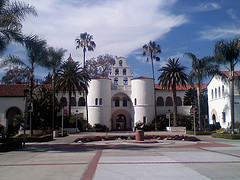Cal State System Proposes New Fees

The so-called “Graduation Incentive Fee“ would charge an additional fee on top of normal tuition for students who have completed 150 credits – the equivalent of about five years of classes.
CSU would also charge extra tuition on students taking classes worth 18 or more credits per semester, or who fail a class and are forced to repeat it.
These measures can either be seen as incentives for students to graduate on time and take up fewer university resources, or as unfairly punishing poorly performing students.
Public universities across the country have been attempting to improve their poor graduation rates.
The proposed fees are presented as charging those students who take more than their fair share of classes.
The targeted groups take up seats in classes that could be given to other students. For instance, CSU students who fail a course and repeat it take up 40,000 spots in classes every semester.
Advocates say that the fee changes will create more space in the CSU system, allowing thousands of additional students to be admitted.
The Graduation Incentive Fee will likely affect thousands of CSU students. According to 2007 data from the California Postsecondary Education Commission, more than 10 percent of CSU students graduate in their sixth year.
Alex Salgado, a student at Cal State Fullerton, believes that motivating students to graduate on schedule by increasing fees is unrealistic. He says, “because our schools are pretty impacted, you don’t get classes as fast as you’d want. I don’t think its practical that you’d graduate in four years.”
Many university students cannot stay on their graduate timelines because they transfer between schools, change their majors or because universities simply do not offer enough of the classes they need to graduate.
Salgado also believes that it would be unfair to levy additional fees on students who fail a class because it is too difficult or for other reasons out of their control.
The proposed fees, which could take effect as soon as fall 2013, could help some CSU students by creating more space in classes, but could also cost them thousands of dollars. The California State Student Association has not taken a position for or against the proposal.
However, the proposed increases are not as steep as they once were. With the passage of Proposition 30, the CSU Board of Trustees will now vote on a slightly reduced set of fees.
Reach Staff Reporter Axel Hellman here.



